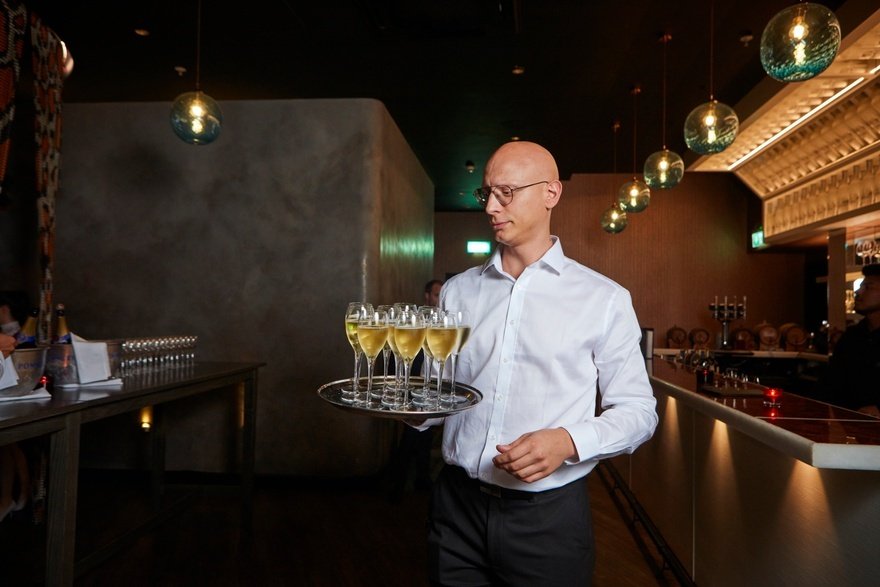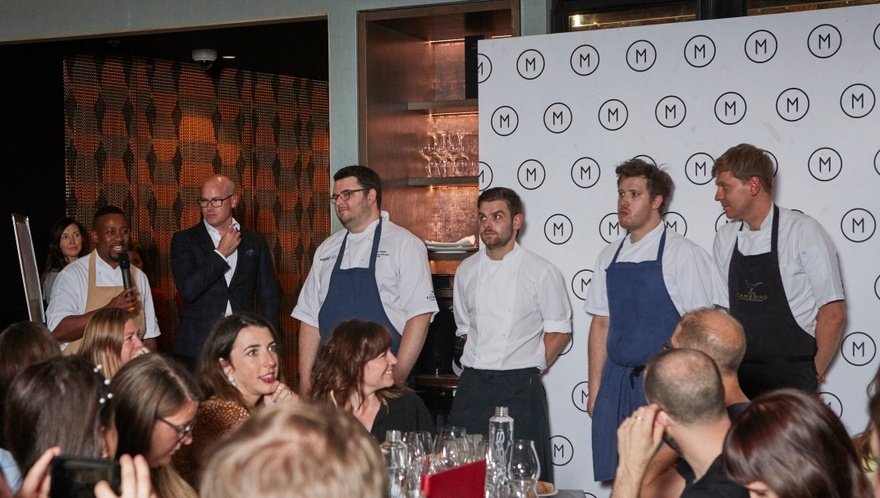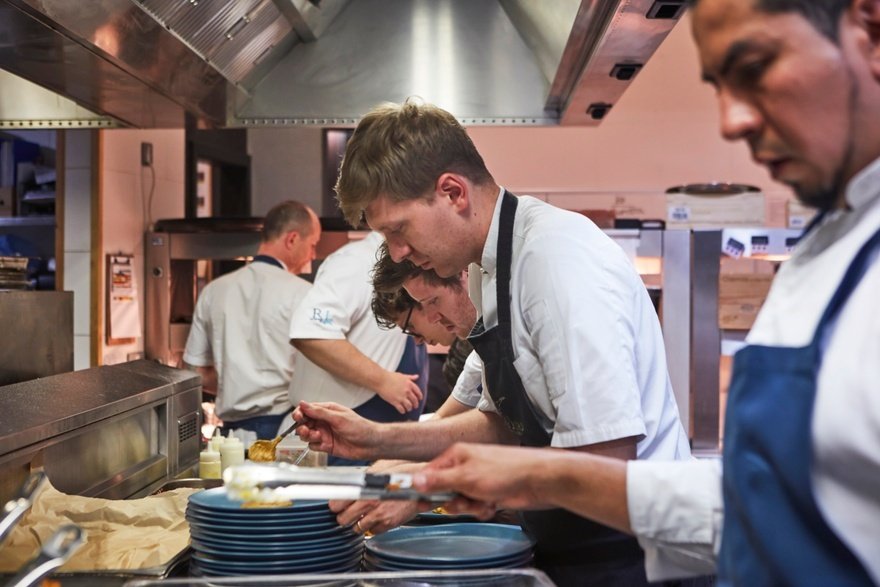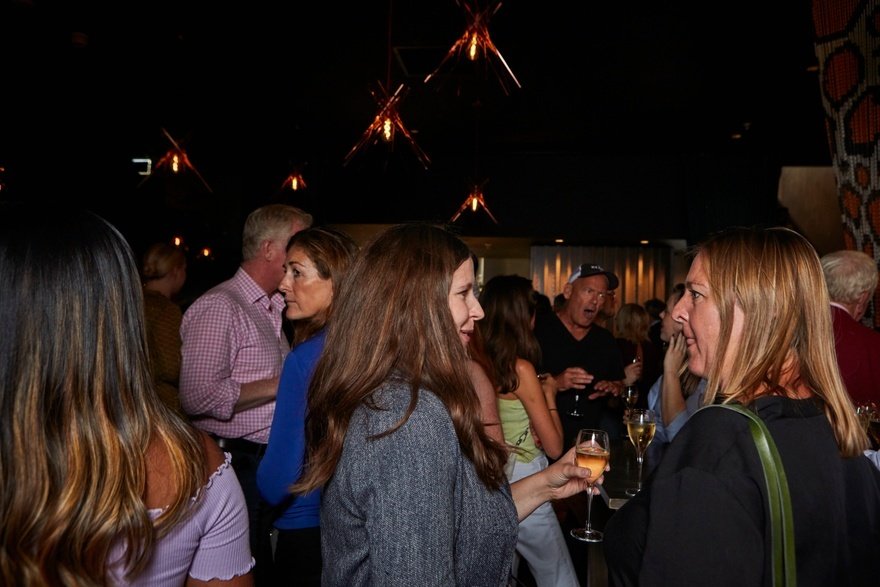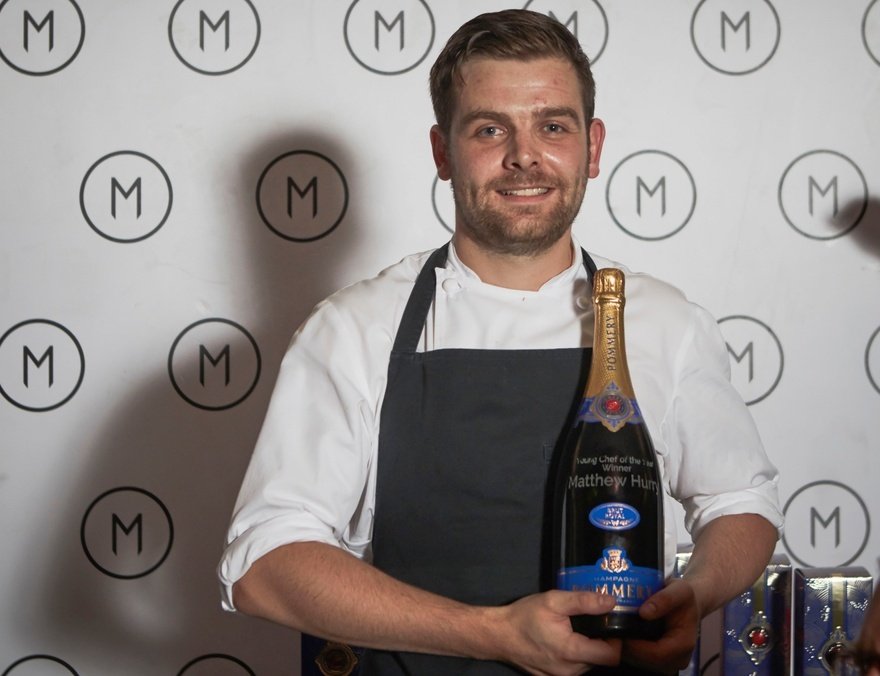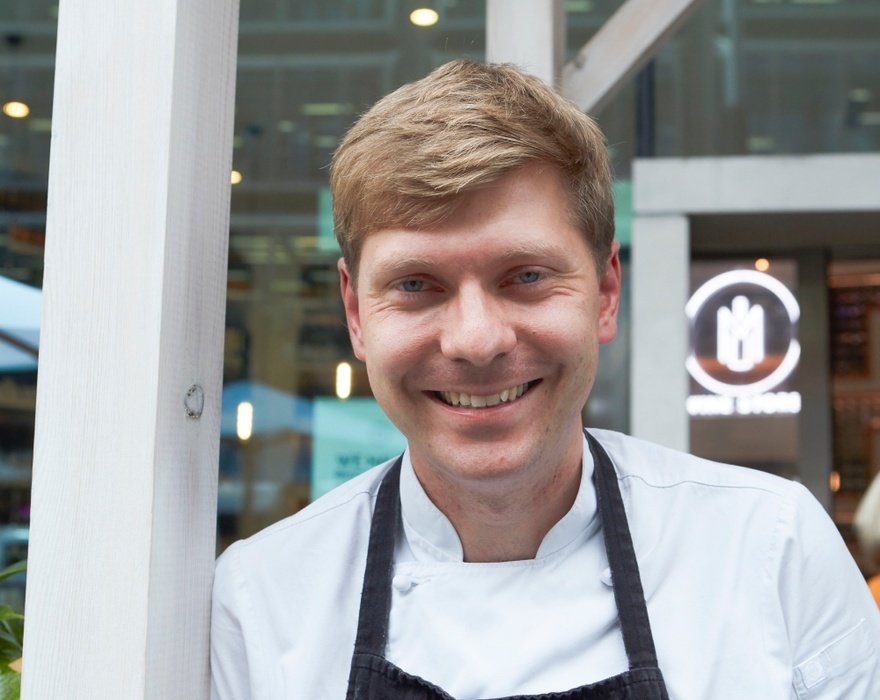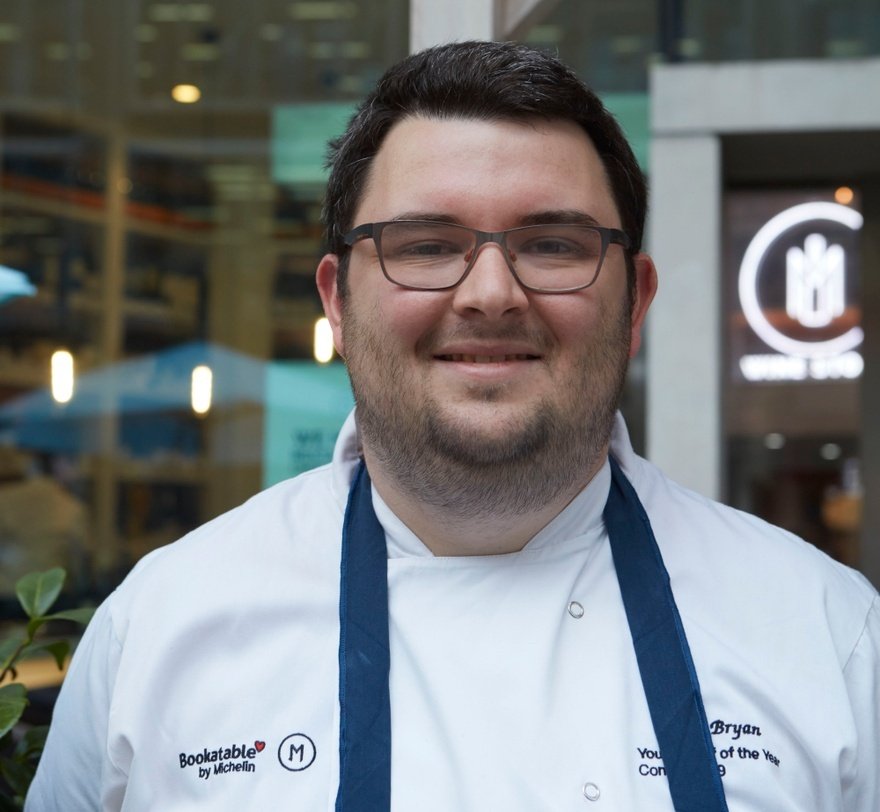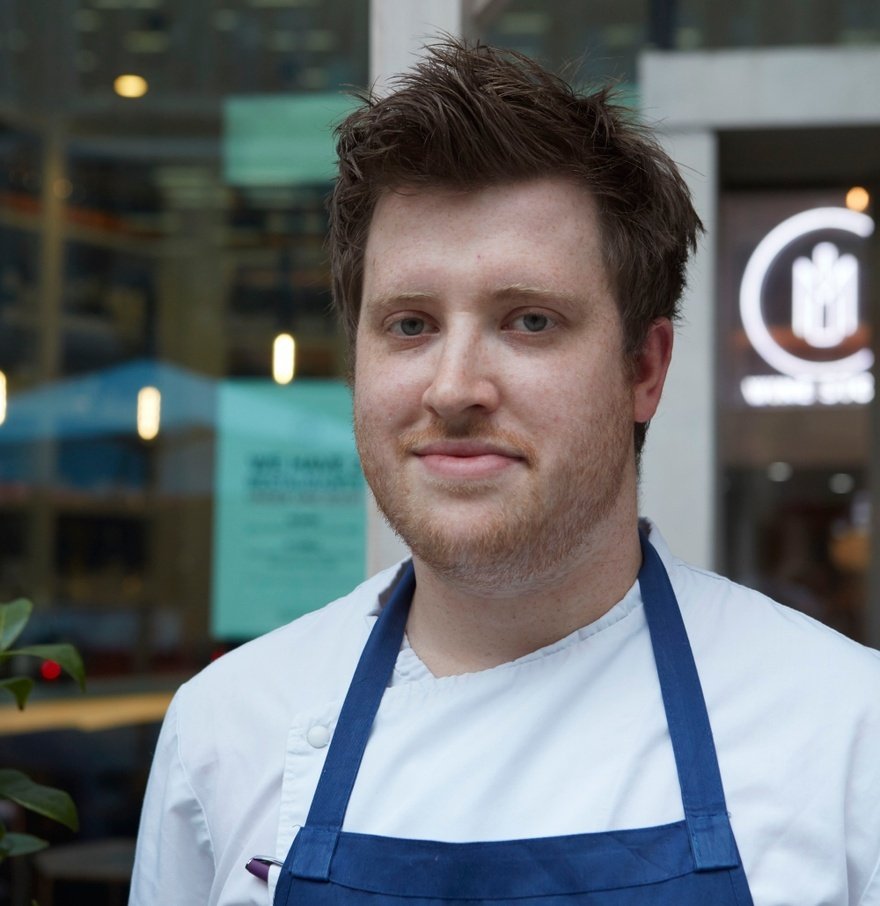Matthew Hurry has triumphed in the M Young Chef of the Year, a competition that tests the contestants' financial nous alongside their culinary skills. Andy Lynes reports
Being a successful chef-restaurateur requires much more than exemplary cooking skills. Having a good head for business and a focus on getting the guests through the doors is equally as important as filleting a fish or producing the perfect soufflé.
Over the past two years, the M Young Chef of the Year competition has tested contestants on their financial and marketing acumen alongside their ability to produce an enjoyable four-course menu.
In winning the 2019 competition, Matthew Hurry, 26-year-old sous chef of Laurent restaurant at the Hotel Café Royal, London, proved that he is the all-round package. He is the fourth chef to hold the title, following in the footsteps of last year's winner, Hamish Pearce from Pidgin in Hackney, and joint winners of the inaugural 2017 competition, Perry Torrance of Smiths of Smithfield and Jack Barwick, who at the time worked at the now closed Paradise Garage.
Hurry's success was revealed at a celebration dinner at M Victoria, at which he and the three highest-scoring finalists each cooked a course.
Open to UK chefs aged between 18 and 29, the competition, in which finalists serve a four-course menu of their own devising at a pop-up night at M Victoria, was devised by Michael Reid, culinary director of Martin Williams's M Restaurant group, as a way to celebrate young talent and bolster morale in the hospitality sector, something that has become increasingly important in the light of Brexit.
"When we started, there was a real recruitment issue, and it's only getting worse. The competition is a way of giving back and championing the talent that is within the industry and giving them the limelight," says Reid, who oversees the competition from its launch in March each year through to the awards in September. He judges the competition alongside Williams and a yearly changing roster of guest judges, which this year included chefs Sabrina Gidda, Steve Groves, Ben Tish, Alyn Williams and James Knappett, as well as The Caterer's editor Chris Gamm.
"A lot of the chef competitions out there are aimed at ability, skill sets and creating the perfect fish, and that is a huge part of our craft, but it takes so much more than that to be a successful chef or restaurateur," says Reid. "You need to not just have incredible food, you need to have bums on seats, a restaurant that has people coming back time after time, so we wanted to create a competition that challenged that. It takes people out of their comfort zone and really pushes them to either excel or find out a little bit more about themselves."
Reid says he had enquiries about the competition from 200 chefs this year and, of those, 50 submitted the required four-course menu with a theme of sustainability at £45 a head, with costings for 50 covers.
He whittled the paper entries down to 30 candidates and held regional cook-offs at M Victoria and Gaucho in Manchester, where the contestants cooked their signature dish from their submitted menu and were then interviewed by Reid and M Restaurants' operations director André Mannini. "We're challenging them not just to be line cooks, but to have the whole picture for the event and present their business plan for what it's going to take for them to win," says Reid.
The 16 finalists were then tasked with marketing their own pop-up night at M Victoria in July, with their promotional skills being almost as crucial as their cooking abilities in winning the competition. "Half of the marks were awarded from the guest judges and the rest by the diners, so they need to fill the restaurant. The more guests they have – up to 50 – the closer they are to that perfect score. If they only half-fill the restaurant, they can't win."
The increase in the number of applicants this year is a trend that Reid expects to continue. This year was also the first time the cook-off was held outside London. "There are so many amazing chefs beyond London," he enthuses. "That's what I'd like to focus on over the next couple of years: getting more talent from elsewhere. This year was the first year we had two incredible female chefs who got through to the final 16, and I'd love to see that number grow each year.
"This competition could outlast us all. It's got such a strong format and identity, the more we grow, the more sponsors we take on, it can go anywhere. We've already been speaking to a couple of TV production companies, we'd love to do a documentary on it as well. There's so much potential."
The winner
Matthew Hurry, 26, sous chef at Laurent, Hotel Café Royal, London
Having worked as a kitchen porter in his local pub while still at school, Matthew Hurry began his culinary career at the North Hill hotel's Green Room restaurant in Colchester, Essex, as commis chef. In 2012, he joined the brigade at the InterContinental London Park Lane, where he stayed for four years, working his way up to chef de partie. He was part of the opening team of the Four Seasons hotel at London's Ten Trinity Square, and then moved to Sea Containers as junior sous chef before becoming sous chef at Laurent.
Why did you enter the competition?
This is my first competition. I just wanted to challenge myself and it looked like good fun. It was something a bit different – I had to come up with my own menu and not just use ingredients put in front of me, and I could showcase myself.
How did you develop your menu?
It was spring when we started, moving into the summer, so lamb popped into mind. I used little elements and bits that I've used in other restaurants and hotels to fit it together. My executive chef and head chef helped me to understand the ingredients a bit better and we went from there. I tried to keep it light – I think pan-frying, pan-roasting, light roasting and sous vide are best for the time of the year.
How did you address the sustainability element of the brief?
I constructed my menu so there was zero wastage apart from potato skins. I used every part of the lobster for the second course – the shell and every bit of meat, head and claws. With the lamb, the bones and trimming from the saddle went into the jus, and all the potato trimmings from the pommes anna went into the courgette velouté starter. For the dessert, I soaked the sponge in pineapple juice that I made from the pineapple trimmings.
How was the competition for you?
It's been fun coming up with the menu and recipes and finding suppliers for things like peppermint. The pop-up was tough. I did 72 covers, which was one of the busiest nights. I had mise-en-place sheets and recipes prepared, the chef and I cracked on in the morning and got all the mise-en-place done, then I had another chef arrive later to help with service. It's a great experience, I think they could make it a very big competition.
The highest-scoring finalists
Jordan Kerridge, 29, head chef at the Stafford London
Jordan Kerridge began his career as a commis chef at the Royal Automobile Club in London before working at four- and five-star hotels, including South Lodge in West Sussex and the Stafford London. After a stint at Jodie Kidd's Half Moon pub in West Sussex, he rejoined the Stafford as head chef. Kerridge was the Chaîne des Rôtisseurs GB Young Chef of the Year 2016, Competition Chef of the Year at Westminster Kingsway College 2012 and Escoffier Competition Chef of the Year 2012.
Why did you enter the competition?
My culinary director Ben Tish was involved in the competition this year as a judge for another candidate. He wanted someone from the Stafford to enter and I put myself forward. What attracted me about it was that it was my food, and it's on-topic in terms of sustainability.
How did you develop your menu?
Four courses for £45 isn't a lot of money, so you have to be creative – you can't just use luxury ingredients. My starter was a grilled vegetable salad, which cost nothing, but I put a lot of love into it. I wanted to use British ingredients, such as South Downs lamb, as much as possible.
How did you address the sustainability element of the brief?
I used secondary cuts. I got a whole saddle of lamb in and I did crispy lamb belly, which is normally waste, and a small piece of the pink loin. I used the necks as well and made my sauce from the bones.
How was the competition for you?
You're going into someone else's restaurant that you've never previously worked alongside, and you've got to produce the best quality of food you can for a large number of people. I had 48 people booked and served 66 in the end. That was the big challenge for me, but it went incredibly well.
Luke Bryan, 29, head chef at Kricket, London
Luke Bryan worked for Paul Merrett at the Victoria in East Sheen, west London, for four years, and went on to work at Benares with Atul Kochhar for 18 months. He spent time at Asia de Cuba and had a short stint at M before taking on the role of head chef at Kricket's outpost in the Television Centre in White City.
Why did you enter the competition?
I didn't really know about it until my bosses pointed me in the right direction and said "Go and do it". I did MasterChef: The Professionals in 2013 and got to the final six and did other competitions in college, but I hadn't done a competition in a long time.
How did you develop your menu?
Last year, I went to India for a month and then got an amazing job at Kricket, and that's where my menu's developed from.
How did you address the sustainability element of the brief?
As a restaurant, we went down to Sussex when wild garlic was in season – it's an underused and sustainable product. I used the pickled buds on my starter of cuttlefish.
How was the competition for you?
This competition is great because you cook for your colleagues' friends and family, which is not something you can do very often. As long as you're organised during the day, it's really good fun.
Jamie Warley, head pastry chef at St Ermin's hotel, London
Jamie Warley was a pastry chef at the Michelin-starred Rhodes W1 restaurant in London's Marylebone and went on to become head pastry chef at Searcy's at the Gherkin before spending a year with Jason Atherton's Social Company as junior sous in the pastry section. He worked as head pastry chef for Adam Simmonds at Pavilion and Launceston Place, both in London's Kensington, before spending a year as head pastry chef at Dickie Fitz in Fitzrovia. He joined St Ermin's hotel in 2017 and was named an Acorn Award winner in 2019.
Why did you enter the competition?
I've not done a competition like this before, and it was the hotel that suggested it to me. At first, I though was a little bit strange because I'm a pastry chef, but in my desserts I use a lot of what would normally be deemed savoury flavours, so I thought it would be a good opportunity to test myself.
How did you develop your menu?
I picked sea trout because it was in season and outside of its breeding time. Lamb came into season just before the competition started. The dessert was celeriac parfait rolled in puffed wild rice with white truffle cream, banana bread, caramelised banana, bacon ice-cream, crispy bacon shards, celeriac crisps and fresh truffle. It was inspired by the sweet-savoury combination of American pancakes with bacon and maple syrup.
How did you address the sustainability element of the brief?
I planned a menu where I could use as much as possible. I had a diced beetroot garnish on my starter and turned the trimmings into a purée. Once I'd filleted the trout, I used the bones to make a stock.
How was the competition for you?
Being in a new kitchen, not knowing where anything is or any of the equipment is challenging, but as you go through the day, you get more comfortable. The competition challenges a chef on all aspects: menu planning, costings, efficiency of mise-en-place, how they run a service. It's a test of a chef's overall ability. I'd definitely recommend it.
Photography by Jodi Hinds
Continue reading
You need to create an account to read this article. It's free and only requires a few basic details.
Already subscribed? Log In


